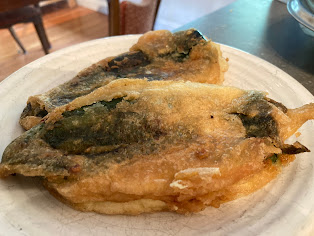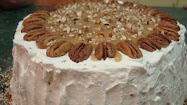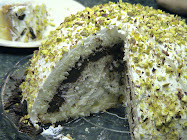I’ve studied religion long enough to know that grocery stores are not the usual places for out-of-body experiences. But then Nasr Foods was not an ordinary grocery store. The array of olive offerings in the store alone could have induced rapture. Add to that the racks of pita, the stuffed eggplants, the bins of pistachios and dates, the mounds of parsley, mint and dill, the flats of olive oil and could you not say that this was heaven?
A few years before moving to Toronto I visited the Middle East and there were many memorable food moments I won’t forget: freshly picked figs bought from a roadside stand; baklava, namoura and syrup sticky fingers; picnicking in the long windy grasses of the ruined 5th century martyrolium of St. Simeon the Stylite; arak—never again; sitting down to a simple but oddly elegant breakfast of pita, salty cheese, pommelo jam, olives and a pot of tea; feeding a cerebral palsied girl in Cairo’s Garbage City, wiping clean her guava-ed lips, sharing a smile. The memory of all this combined with the culinary prospects awaiting me left me more than a little heady on my first visit to Nasr Foods. And in this astonishing bafflement of possibility a pervasive, long ago childhood memory of belonging strangely and unexpectedly warmed my heart. I was being pulled back to a moment in my childhood, a six, seven year old girl sitting near the very front of the long, narrow building that was the Mennonite church I grew up in. I had lived in Toronto for a few months, feeling wretchedly alone with no visible prospects of this changing but in that heart-warmed moment—the stunning assortment of olives completely forgotten—I knew with an unshakable certainty that the big, overwhelming city of Toronto could—and would—one day be home.
I came to the childhood memory of belonging through an unlikely route that afternoon in Nasr Foods. On one of my trips to the Middle East I had the rare opportunity to visit a large Damascan mosque. On that Friday morning the women of the group I was with were escorted by the Imam’s daughter-in-law up two flights of stairs to the area reserved for female worshippers. We entered a room filled with thousands of hijabed women and as we made our way to the front I felt myself effortlessly melting into the surrounding sea of black, embraced by an overwhelming sense of belonging. I knew this space; I had been formed in such a space. I no longer knew whether I was seeing women veiled in black hijabs or whether I was seeing the black kerchiefed, darkly dressed women of my childhood church, my grandmothers and women of their generation, who filled the benches immediately behind where I, the six year old girl was sitting, surrounding me, watching over me as only matriarchs can.
I began my life in that Mennonite church in my mother’s arms, I presume, but I have no memory of that. In my earliest recollection I am sitting with my father on the men’s side (my mother being in the nursery caring for my younger brother). I remember nuzzling up to my father, rubbing my hand across his rough, bristly cheek. I remember counting the ceiling tiles, so far above that I quickly lost my bearings in the maze of stained white squares, I remember pulling his arm towards me to look at his watch, waiting for him to point out the minutes remaining. But it wasn’t many years before I left my father’s side and joined my older sister across the aisle. We sat at the very front, which is where young girls sat, safely lodged between the watchful eyes of the ministers looking out over the congregation and the rows of older women behind us who kept one ear cocked for any untoward rustlings while they listened to the droning sermon with the other. Behind my grandmothers sat women my mother’s age, some in black kerchiefs, others, like my mother, donning a more modern hat. Behind my mother and her peers sat a younger generation of married women, and at the very back, the teenage girls. Across the aisle this structured pattern of place was repeated among the boys and men. Sitting up at the front I had no reason to doubt that in a few years I would move to the back of the church and begin the inevitable move forward, through the life roles offered women in that community. What I was and what I would become were known, I had a place, I belonged.
It might have been the hijabed women who were filling their carts, it might have been the Arabic being spoken all around me, it might have been the memory of figs and guavas, maybe it was the olives. But whatever it was that afternoon in Nasr Foods that pulled me back into those segregated spaces of black clad women, my heart warming vision enticed me with its promise of belonging. I had never before been as lonely as I was during my first months in Toronto and I welcomed the proffered reassurance. After a decade of living in Toronto this big city has become home just as I foresaw but I am still lonely, sometimes as intensely as when I first discovered Nasr Foods. Other times my friendships, commitments, activities crowd out the loneliness. But the loneliness always returns.
In my grimmest moments Nasr Foods has been one of my truest companions. I have returned again and again to its aisles, hauled more bags of groceries from that store than imaginable, cooked yet another new recipe until Middle Eastern cooking has taken pride of place in my culinary pursuits: eggplants stuffed with garlic cloves, tomatoes and parsley in the legendary dish Imam Bayildi; Circassian chicken in paprika-laced walnut sauce; a dazzle of green olives, walnuts, scallions, pomegranate seeds mixed in a salad; the pureed simplicity of fava beans, olive oil, lemon and dill—there was no end to what was possible when the well-stocked shelves of Nasr Foods were at my disposal. But my Nasr Foods-inspired cooking has not only been a matter of filling lonely hours, though it has done that. The culinary possibilities it encouraged often lured me away from my loneliness, inviting me to expand and foster, and then to share my creativity. As my creativity deepened and broadened, so did I, grounding me in the knowledge that I belong because of all that I am and not only because there are belonging structures that hold me cocooned between ministers and grandmothers. It was after all as a teenager that I boldly and defiantly went to sit on the boy’s side no longer willing to be defined by those structures.
From time to time in my loneliness I return to my childhood memory. I wonder at times whether the memory keeps me tethered to an impossible belonging, to a yearning for a world that no longer exists or even whether the familiarity of my loneliness cocoons me now as securely as my grandmothers once did. Other times, however, I know my childhood memory sustains me, drawing me back into the core of my being, reminding me that belonging matters, that to be lonely is to be diminished. If this knowledge is a gift--as I hope it is--it is a tender and vexingly fragile promise that the gods have given me.
The last time I saw Nasr Foods it had closed, gone bankrupt, its windows papered over. Driving down Lawrence Avenue more recently I noticed that another Middle Eastern grocery store has opened up at that location but I have no desire to go there. I do miss the olives though, terribly, especially the Syrian ones, their flesh hard and bitter, pungent with the flavour of thyme.
(I have wanted to write about my experience in Nasr Foods for many years but it was not until March when I read Lonely: Learning to Live With Solitude by Emily White that I found the words--and courage--to write this posting.)
Thursday, 27 May 2010
with visions of ... olives (my apologies to john wesley)
Labels:
Blumenort,
Damascan Muslims,
hijab,
loneliness,
Mennonites,
Nasr Foods,
olives
Subscribe to:
Post Comments (Atom)















































1 comment:
There is so much here Kerry... the vivid images, the difficult feelings. Bravo. Thank you for this gift of a piece.
Post a Comment